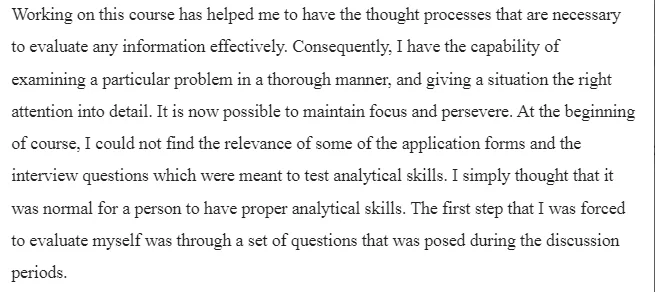Analytical Skill Building
Lieu of a term paper or final exam, you will create a portfolio that documents your success in meeting course goals. This portfolio project is the capstone project for the course; please construct a high- quality portfolio that effectively documents your achievements in this course.
Your Portfolio should be organized into three main sections:
Analytical Skill Building:
To what extent has your work in this course helped you to improve your critical reading, writing, and thinking skills?
Knowledge Acquisition:
To what extent have you gained knowledge of important concepts, ideas, and perspectives through your study of the humanities? Remember to include a discussion of ethical theories that you have studied.
Practical Application:
To what extent have you learned how to connect course material to contemporary society and to your own life?
Each section of your portfolio should include a narrative assessment that gives your honest and incisive reflections on your progress in these areas. Your comments should include both an overall evaluation and reflective comments about your progress. For example, in the first section you might describe exactly how much your writing skills have improved this term, and then you might discuss the work habits that contributed to your success. Your discussion should be objective and balanced; for example, if there are factors that have made it difficult for you to achieve a certain course goal, you should include them in your reflections.
Each section of your portfolio should also include specific evidence that documents your reflective narrative. For example, if you believe that your writing skills have improved, you might want to document this observation with examples of weaker writing from your first paper alongside examples of stronger writing from later papers. Likewise, if you observe that you took the writing process very seriously, you might want to document this by including examples of outlines, rough drafts, rewrites, etc.
The documentary evidence you include in your portfolio can be anything related to the course: papers, discussion postings, seminar interactions, your own notes or reading diary, course-related email, etc. You do not need to have evidence to back up every point you include in your reflections, but you should include evidence that documents the most important claims you make.
You have two options for synthesizing your narrative evaluation and documentary evidence. One option is to give the narrative and then give a separate listing of evidence. If you do this, you will need to carefully organize your presentation of evidence so that it is clear to your reader which items of evidence relate to which claims in your narrative. The second option is to integrate documentary evidence into your narrative.
There is no absolute length requirement; your job is to do what it takes to present clear and effective narratives and documentary evidence in all three of the areas listed above. This is a challenging task, and it will involve a significant, well-thought-out submission. For example, if you plan to submit your portfolio as a Word document, your narratives plus documentary evidence would likely require at least 3–4 pages per section, or around 9–12 pages total. However, this is only an estimate; getting the job done in fewer pages is fine.
Submitting your portfolio as a Word document is probably the simplest option. If, however, you would like to format your portfolio in a more creative way, you may submit your portfolio in PowerPoint or in another multimedia format approved by your instructor in advance.
Your portfolio will be graded according to how well you present thoughtful and clear reflections about your work in the course, and how effectively you gather, present, and organize specific evidence that supports your reflections. What matters most is that your reflections are thoughtful and accurate and that they are backed up by specific evidence. Your grade is not simply a function of how well you say you met the goals. For example, if you can thoughtfully explain why you did not make good progress on a certain goal, your explanation will earn a higher grade than a perfunctory or unpersuasive assertion that you did well on everything.
Answer Preview-Analytical Skill Building

